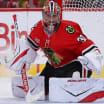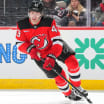When comparing the scoring totals of each player, it's important to consider that Gretzky played during a higher-scoring era. If we could transport Ovechkin back in time so he could start his NHL career in 1979-80, like Gretzky, then Ovechkin's total already could be ahead of Gretzky's after his 13th NHL season, and not far behind his record.
RELATED: [Gretzky wants to see Ovechkin win Stanley Cup| Ovechkin scores 600th NHL goal]
To simulate this time-travel scenario, I stepped through Ovechkin's career and divided his goal totals each season by the NHL average goal-scoring rate and then multiplied it by the League average in the corresponding season in Gretzky's career. I also made a slight adjustment based on a season being 80 games in Gretzky's era, not 82 as it is today (or 48 in 2012-13).
To take the most significant example, consider each player's third season. Gretzky set the single-season NHL record with 92 goals in 80 games in 1981-82, and Ovechkin scored 65 goals in 82 games in 2007-08, the most scored by a player since 1995-96.
Who would have the higher scoring totals if he had played in the same season?
In 1981-82, players combined for 6,741 goals in 28,467 games, an average of 0.237 goals per game. In 2007-08, roughly the same number of goals were scored, 6,691, but because there were 30 teams instead of 21, they were scored in a far greater number of games, 44,266, for an average of 0.151 goals per game.


















